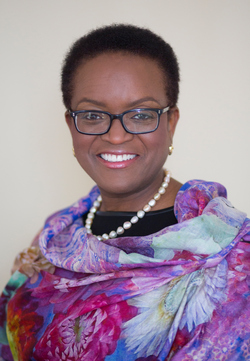Valerie Smith


President Valerie Smith
Doctor of Letters, honoris causa (2016)
President Valerie Smith is the fifteenth President of Swarthmore College, one of the most prestigious liberal arts colleges in the United States. She is the first African American president in the College’s 152-year history. An academic who leads by example, President Smith is committed to fostering an inclusive environment at Swarthmore and promoting progressive liberal arts education throughout the world. Previously at Princeton University, she served as Dean of the College and founding Director of the Center for African American Studies; and at the University of California, Los Angeles, she chaired the Interdepartmental Program in African-American Studies and co-directed the Cultural Studies in the African Diaspora Project. Both of her parents are retired educators; her father was a Professor of Biology and her mother was an elementary school teacher. The academic experience of her parents, and their migration history as African Americans from the south to the north, have been President Smith’s inspiration and foundation for her humanities research and teaching related to questions of identity, migration, and cultural memory. The eldest of three children, she was born in Manhattan and raised in Brooklyn. The abundant cultural resources of the city shaped her love of the arts, theatre, literature, and appreciation of cultural diversity.
President Smith’s illustrious career spans across small private and larger research universities. She earned her BA in English from Bates College, and MA and PhD in English from the University of Virginia. A renowned scholar of African-American literary and cultural studies, President Smith has authored or edited nine books, and written numerous articles on African American literature, culture, film, and photography. In 1988, President Smith published Self-Discovery and Authority in Afro-American Narrative, which was one of the earliest books to theorize connections between antebellum slave narratives and modern and contemporary African American literature. Her second book, Not Just Race, Not Just Gender: Black Feminist Readings, published in 1998, explored the mutually constitutive nature of race, gender and class through readings of film, television, and moments of cultural conflict. This book has been a pivotal text for studying race and popular culture in conjunction with the field of black feminist studies. As the founding Director of the Center for African American Studies at Princeton, President Smith successfully turned the center into a dynamic and top-ranked teaching and research unit on critical race theory and black feminist research.
As a leading scholar of literary and cultural studies, President Smith strongly believes that the most urgent question liberal arts education ought to address is the role of the humanities in educating future generations of citizens who will contribute to the common good. Hers is a lifelong career committed to finding ways to communicate the value of humanistic discourse in a cultural moment that is focused on the importance of technical knowledge, as well as in a social and political environment marked by increasing racial and cultural tensions.
For her outstanding scholarship and research achievements, President Smith has been awarded many fellowships and awards, the most prestigious of which include the John Simon Guggenheim Fellowship, the Alphonse G. Fletcher, Sr. Fellowship, and the President’s Award for Distinguished Teaching at Princeton University. The first two are highly competitive awards that acknowledged the significance and impact of her scholarship, while the third acknowledged the impact she has had on undergraduate and graduate students as a teacher, mentor, and adviser.
In recognition of her distinguished scholarship in African-American literature and culture, her outstanding service and leadership among higher education institutions, and her longstanding commitment to promoting liberal arts education, HKBU is pleased to nominate President Valerie Smith to receive the award of Doctor of Letters, honoris causa.